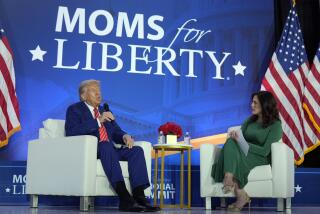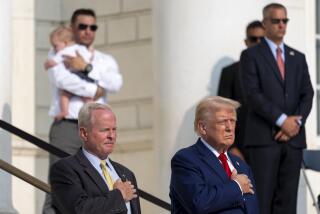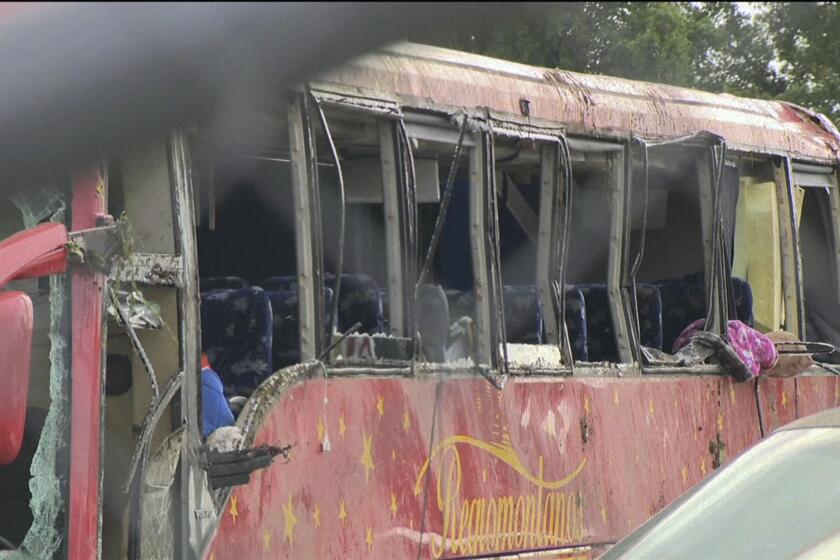Soviet Coup Collapses : Gorbachev Returns, in ‘Full Control’ : Kremlin crisis: The Soviet president declares that the high-level officials who tried to topple him will be made to bear ‘full responsibility.’
Reviled by most of the world, its grip on the Soviet Union waning by the hour, the hard-line Kremlin junta that ousted President Mikhail S. Gorbachev collapsed Wednesday, and Gorbachev returned to Moscow, reassuring his people and the world that he is again in “full control.”
In a brief interview as he emerged from his plane here early today, Gorbachev said his captors had failed in an attempt to break him.
“Society must know, the entire world must know what they were up to and what they wanted to do with me and what they wanted from me and did not get from me,” he said.
“What they attempted to do to the President and his family in these days, when for 72 hours they surrounded him with troops on sea and on land and wanted to break him--nothing came of it.”
He promised to give more details of his ordeal within a day or two.
Earlier, in a message read Wednesday on Soviet evening television news--his first words to be made public after three days spent under house arrest--Gorbachev said he will be back at his desk in the Kremlin within 24 hours.
He also made it clear that the high-level officials who tried to overthrow him--many of them longtime and trusted colleagues--would be made to bear “full responsibility.” Within hours, the reckoning may have begun: Russian Federation authorities reported that the chairman of the KGB, one of the plotters, had been arrested.
From his country home in the Crimea where he had been held, reportedly by 30 KGB agents in league with the plotters, Gorbachev spoke by telephone to President Bush to assure him that the Soviet people had rejected the right-wing “adventurists” and that his reform course to democracy will continue.
“The dangerous period is drawing to a close,” Nursultan Nazarbayev, the president of Kazakhstan, told the official Tass news agency after speaking to the 60-year-old Gorbachev via telephone.
For many in the Soviet Union and the world at large, who watched with trepidation and dismay as this week’s drama unfolded in the streets of Moscow, the restoration of Gorbachev, the 1990 Nobel Peace Prize laureate, was the happiest of possible endings for a country that has known so much sorrow, blood and tears.
Apparently acting on the Soviet leader’s order, the federal prosecutor launched criminal proceedings against the eight-member State Emergency Committee for “crimes against the state.”
On Monday, with Vice President Gennady I. Yanayev giving himself the title of “acting” Soviet president, the committee had claimed all power in the land.
As an overwhelming array of institutions--from the Communist Party to the Kremlin-backed “peace committee”--began announcing Wednesday that they had refused to sanction the plotters’ actions--four of them, including Defense Minister Dmitri T. Yazov and KGB Chairman Vladimir A. Kryuchkov--reportedly flew to the Crimean mansion they had turned into Gorbachev’s prison, perhaps to beg for mercy.
Outside Russian government headquarters on a slope by the Moscow River, transformed by Russian President Boris N. Yeltsin and his supporters into the bulwark of popular defiance to the right-wingers, tens of thousands of haggard defenders raised their voices in throaty Russian cheers of “Ura!” (Hurrah!) at the news that the putsch was crumbling.
“The threat of an armed attack has passed,” Konstantin I. Kobets, Russia’s defense minister, told the motley, weary crowd that had come to erect barricades and shield the building and Yeltsin from the might of Soviet armor. “This is our victory. . . ! This is the victory of democracy!”
Rapidly capitalizing on his hugely increased stature as the embodiment of popularly elected rule, Yeltsin won agreement from his legislature Wednesday for unprecedentedly vast powers enabling him to remove elected leaders of Russia’s regional councils if they had sided with the right-wingers. He fired four men by nightfall.
Additionally, to short-circuit the often reactionary bureaucracy in the provinces, Yeltsin won the right to directly appoint and fire regional administrators.
Russia’s leader also decreed that Leonid P. Kravchenko, head of the State Broadcasting Company and a direct Gorbachev appointee, was out of his job, at least until Gorbachev decides differently.
Yeltsin ordered a criminal investigation of Kravchenko’s handling of government broadcast facilities during the crisis, which from the very first moment were put at the disposal of the self-appointed leaders of the country.
Before Gorbachev’s return, Yeltsin’s government was readying a special welcome for him--and for the men who tried to overthrow him.
“On his return to Moscow, President Gorbachev will be met with honors. The plotters will be arrested,” Kobets said.
From restrictions slapped on the media to limitations on the movements of Muscovites, the machinery of repression put into place by the rightists broke down rapidly and conclusively, although Russian government officials cautioned that the threat was not completely extinguished.
The tanks and armored vehicles that for the past two days had menacingly ringed Red Square, the Kremlin and key central installations in Moscow were pulled out by 4 p.m. by order of the Defense Ministry.
When the columns of 50 or more tracked vehicles roared out of the capital on Leninsky Prospekt, some vehicles were flying the blue, red and white flag of the backers of Yeltsin’s Russia.
In his televised statement Wednesday, Gorbachev ordered Gen. Mikhail A. Moiseyev, chief of the armed forces General Staff, to move back to their bases all army units that had supported the coup with their guns. He also ordered him in the future to obey orders from the Soviet president alone. Units across the country were reported to be in retreat.
Radio Russia, banned by decrees issued by the State Emergency Committee, went back on the air at 2:30 p.m, and Russian TV, whose newscaster was too rushed to even put on the required tie, resumed broadcasting in time to show the emergency session of the Russian legislature that began in the morning.
A thick, black headline in Izvestia, the government daily newspaper, proved to millions of Soviets that the power grab had failed: “The Reaction Did Not Succeed!”
In separate announcements, the Emergency Committee’s ban on independent and progressive newspapers was annulled, and the 11 p.m.-to-5 a.m. curfew imposed on Moscow one day earlier by a military commandant was lifted.
Although much still remained mysterious about the coup--including how and why it had failed--the motive seemed to be revealed by one of Gorbachev’s top trouble-shooters, Arkady Volsky, who said the hard-liners engineered a showdown with Gorbachev on Sunday night by demanding that he order a nationwide crackdown.
“Having in fact isolated the head of state, a group of persons confronted him with the demand to sign a decree imposing a state of emergency,” Volsky said. “The president refused to comply.”
Volsky told reporters that he had spoken to Gorbachev last Sunday and that the plotters’ claim that the president was ailing and so incapacitated that he had to be replaced was a “gross invention.”
At another news conference, Foreign Minister Alexander A. Bessmertnykh said Gorbachev had nothing more serious than a back problem.
By midday Wednesday, the third day of the coup, it became clear that the rightists could not even count on support from the Communist Party, in which many of them also hold high posts.
Although the party was thrown into obvious disarray by the coup and inexplicably remained silent for two days, it finally demanded “immediately” a face-to-face meeting with Gorbachev, its No. 1 official since 1985.
“Without such a direct meeting . . . the party leadership cannot and does not have the right to give a political assessment to events,” the party Secretariat said, making it clear to all that the coup was not the work of the Communist apparat.
The most important republics after Russia also avoided siding with the men who overthrew Gorbachev or stoutly condemned them. Kazakhstan’s Nazarbayev, who waffled during the first hours, finally condemned the “blatantly” illegal maneuver, for instance.
In his message read on evening television news, Gorbachev said he phoned Yeltsin, Nazarbayev, Leonid Kravchuk of the Ukraine, Islam Karimov of Uzbekistan and Nikolai Dementei of Byelorussia and received “unanimous” pledges of loyalty for the future.
By dinnertime, Tass, which on the first day of the coup transmitted the rightists’ pronouncements ad nauseam, felt certain enough of the way the wind was now blowing to transmit a story that disparagingly referred to Yanayev, yesterday’s “acting president,” as “a puppet of forces wishing to preserve the administrative-command system.”
The plotters who flew to see Gorbachev were identified by Tass as KGB Chairman Kryuchkov, Defense Minister Yazov and two high-ranking officials in the Soviet military-industrial complex, Oleg Baklanov and Alexander Tizyakov.
Of the others, nothing certain was known. Valentin S. Pavlov, the prime minister who supposedly suffered an attack of high blood pressure that confined him to bed, and thus disassociated him from any actions taken by the committee, was reported “improving.”
Yazov’s exact status was so murky that there were even rumors in Moscow for a time that he had shot himself.
Lt. Gen. Valery Manilov, the Defense Ministry’s chief spokesman, told Tass in the afternoon that Yazov was still “commanding the Soviet armed forces,” but Tass was openly dissatisfied, noting that Manilov refused to give Yazov’s whereabouts.
Some Soviet media initially said the committee members had been arrested, but they later retracted that report.
As the members of the Russian Supreme Soviet opened an emergency session to debate the course of action to take against the coup, they observed a minute of silence in honor of defenders of their government slain about 10 hours earlier, when citizens loyal to Yeltsin attacked Soviet armored vehicles with rocks and gasoline bombs.
Eyewitnesses said at the scene that four people had been killed, but the country’s governmental crisis made it impossible to confirm the exact number. Various officials said from three to five people had been shot to death by Soviet soldiers or crushed under their tanks.
In his report to Russian lawmakers, an imposing and rock-solid Yeltsin, now arguably the most powerful figure in the land, said some Soviet military detachments, including two battle-decorated guard units, had put themselves under his command.
In a rare moment of levity during the tension, Yeltsin informed the lawmakers that he had rejected an “invitation” from Kryuchkov, chief of the KGB, to be flown to Phoros in the Crimea to see Gorbachev. To leave the building might have meant Yeltsin’s abduction, detention or death.
“Of course I refused,” the white-haired Russian president said, his lips curling in a faint smile.
Instead, as it became clear that the coup was collapsing, the Russian leadership sent the republic’s vice president and premier, along with close Gorbachev allies and advisers Vadim V. Bakatin and Yevgeny M. Primakov, flying to the Crimea to confer with Gorbachev.
Newly appointed U.S. Ambassador Robert S. Strauss, urgently dispatched by President Bush to show American support for Yeltsin and Gorbachev, arrived in Moscow on Wednesday morning as the coup was unraveling and spent much of the day cooling his heels at Vnukovo Airport with other diplomats trying unsuccessfully to get a plane to the Crimea.
Vladimir A. Ivashko, the Communist Party’s No. 2 official, and parliamentary Speaker Anatoly I. Lukyanov, a longtime crony of Gorbachev who nevertheless was closely linked to the right-wingers, flew in a separate plane to see the Soviet president.
The fomenters of the coup rapidly became pariahs for the Bush Administration and other Western countries, leading to retaliatory acts such as the European Community’s suspension of more than $1 billion in economic aid Tuesday.
More to Read
Sign up for Essential California
The most important California stories and recommendations in your inbox every morning.
You may occasionally receive promotional content from the Los Angeles Times.






